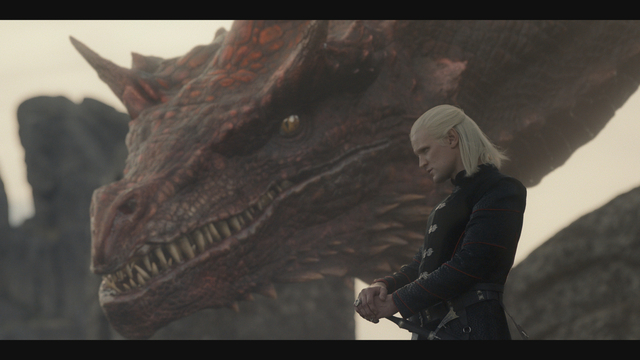
Matt Smith, House of the Dragon@Courtesy of HBO
House of the Dragon: Based on George R.R. Martin’s “Fire & Blood,” the series, set 200 years before the events of “Game of Thrones,” tells the story of House Targaryen.
Season two returning cast: Matt Smith, Olivia Cooke, Emma D’Arcy, Eve Best, Steve Toussaint, Fabien Frankel, Ewan Mitchell, Tom Glynn-Carney, Sonoya Mizuno, and Rhys Ifans. Additional returning cast includes Harry Collett, Bethany Antonia, Phoebe Campbell, Phia Saban, Jefferson Hall, and Matthew Needham.
Season two new cast: Abubakar Salim as Alyn of Hull, Gayle Rankin as Alys Rivers, Freddie Fox as Ser Gwayne Hightower, Simon Russell Beale as Ser Simon Strong, Clinton Liberty as Addam of Hull, Jamie Kenna as Ser Alfred Broome, Kieran Bew as Hugh, Tom Bennett as Ulf, Tom Taylor as Lord Cregan Stark, and Vincent Regan as Ser Rickard Thorne.
Season two credits: Co-Creator/Executive Producer, George R.R. Martin; Co-Creator/Showrunner/Executive Producer, Ryan Condal; Executive Producers Sara Hess, Alan Taylor, Melissa Bernstein, Kevin de la Noy, Loni Peristere, Vince Gerardis. Based on George R.R. Martin’s “Fire & Blood.”
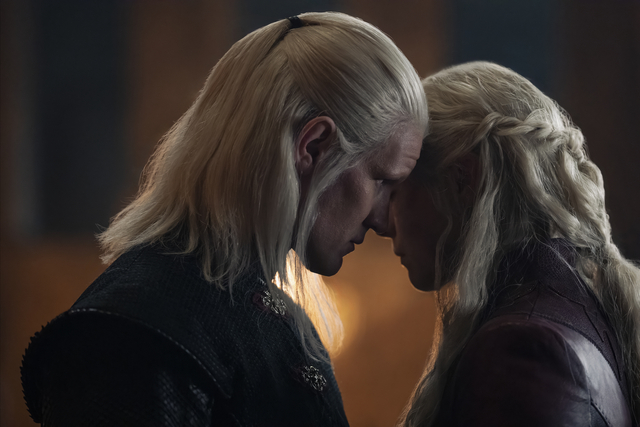
Matt Smith, Emma Darcy, House of the Dragon@Courtesy of HBO
Press Conference with Actors Matt Smith, Emma D’Arcy, Steve Toussaint, Eve Best, Harry Collett, Bethany Antonia and Creator Ryan J. Condal
Q : How did you choose to narrative structure for the new season? Was it easier or harder without those time jumps and flashbacks?
Ryan J. Condal: It was a great challenge in structuring Season 1 just because of that. How do you cover 20 years of story and history in 10 episodes of a brand-new television show and expect everybody to follow it? In Season 1, up until the very end, the episodes happen in these discrete timelines.
So the traditional tools that we rely on as storytellers, where you have a cliffhanger at the end of Episode 2 and then you pick up in Episode 3, you could do a little bit of that. But because they were happening in these discrete time zones, it was harder to lean on that. So these stories had to be kind of complete as formed. Season 2 is traditional serialized storytelling where it’s all happening in real time and we kind of move from episode to episode. And it’s exciting because it’s a way of keeping momentum moving and building excitement. There were challenges definitely to Season 2, but I think Season 1 was a particular narrative pretzel, I don’t know if we’ll need to do that again.
Q : Music in Westeros is very important, is there a song for you guys as actors that really helps you get into the mindset of each of your characters?
Steve Toussaint: For me, it depends on the scene. There’s no one song that would make me feel like Corlys. But if I’m doing an emotional scene with Eve, then I might look for a sad love song. Something deep possibly.
Eve Best: I made a whole playlist this season. But it always started with my powerful Beyonce, I Need Ya, which is a really good way to start the day.
Q : Can you talk about the process of using such specific costumes, hair styling, and props in order to shape your characters not only physically, psychologically, and emotionally?
Harry Collett: This season is just genuinely bigger and better. The way the costumes were done, especially this year, it just felt so immersive. As soon as I put that costume on, I just looked at myself in the mirror, I was like: “Damn, I’m Jacaerys now” from a character perspective. Especially the whole Winterfell cloak was really, really cool. It just felt really surreal. Props are so detailed, there are scrolls that you can pick up in any room and it will be written out in Velaryon or something like that. It’s just so unbelievably detailed. Little things like that, when you step on set, just help you get into character, it makes it so much easier.
Q : And for you Matt?
Matt Smith : I can’t top that. It’s just rich and detailed, we’re really lucky to have the brilliant people who work in all those other departments do such wonderful fantastic work.
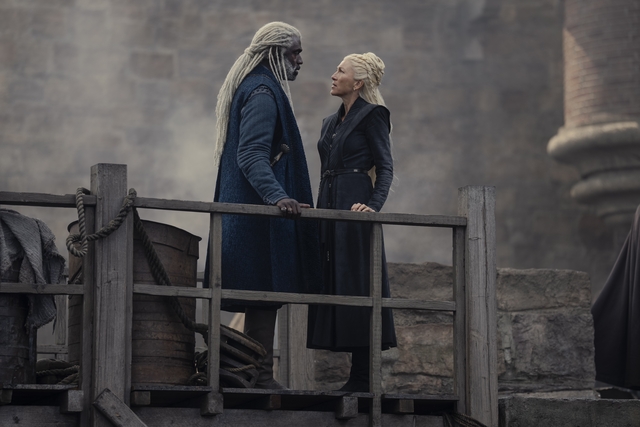
Steve Toussaint, Eve Best, House of the Dragon@Courtesy of HBO
Q : What is the most complex part of adapting such an overarching story?
Ryan J. Condal: There’s nothing unique necessarily about this show versus other shows that are multi-point-of-view. It’s just there are so many wonderful characters in the show, all of them have their own multi-dimensional stories. It’s how you keep the narrative moving forward, tell character stories within, and service everybody in a way that feels deeply rich and realized, have them cross and interact with each other, sometimes even when they’re not literally crossing and interacting.
Something I’m particularly proud of this season that we found in the sort of postproduction process is, as everybody knows, Alicent and Rhaenyra are – even though they spent much of Season 1 together – they’re now apart, they’re literally on different islands and they don’t interact with each other. But in the editing, we found ways to connect those characters. If you see Alicent going through something particularly deep and emotional and you cut to Rhaenyra, there is a kind of filmmaking connection there.
Q : How was playing full seasons of your character? Did watching your character’s younger version help you in any way for Season 2?
Emma D’Arcy: I like to be quite a conscientious worker, understanding the job description better really suits my conscience. A lot of the work of an actor is to fill in the unseen time. In this case, I can actually just watch it. It’s lovely, very unusual to have a character grounding that you can literally watch and return to. I had never shared the character with another actor, of a different age before. It does a lovely job of physicalizing, and externalizing the split self. Structurally, that was beautifully imagined here. Where you can see the younger self from the outside and see the sort of division in time, division of maturity.
Q : Unlike Game of Thrones, this is a book that you can look up and read and it’s over. So you could find out how your characters’ journeys may end. Have you taken a peek at that or is it more helpful to you as performers to not look ahead at that?
Steve Toussaint: We were given the book but I chose not to look at it at all because they are two different media. What happens is you read the book and you go: “Oh my God, my character does this, it’s fantastic!” And then Ryan goes: “No, he’s not gonna do that.” I didn’t want to fall in love with what was on the page. Every so often fans will tell me and I’m like: “Well, that doesn’t guarantee anything.” We might not always stick to the book. I felt it be better to just play what was in the script.
Q : How has the loss of his brother influenced Daemon in Season 2?
Matt Smith: He lost everything. Emma mentioned in this meeting we had earlier that grief is the great catalyst of the season in many ways. Everything is about the death of his brother. Every single action is related to him. It allows us to see a version of Daemon that is slightly more exposed and honest because he just misses him but doesn’t even know how to communicate that.
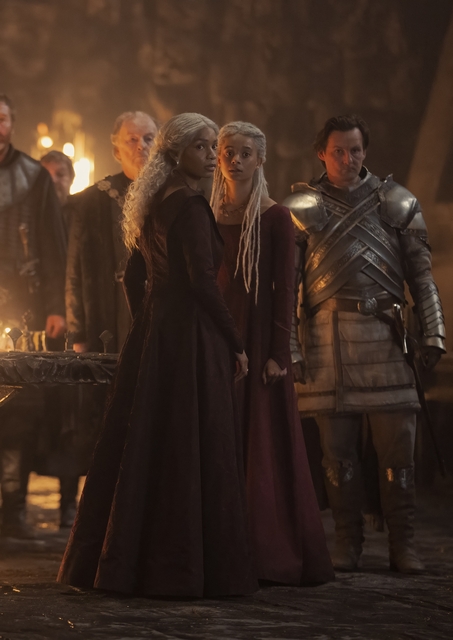 Bethany Antonia, Phoebe Campbell, House of the Dragon@Courtesy of HBO
Bethany Antonia, Phoebe Campbell, House of the Dragon@Courtesy of HBO
Q : When you got the scripts for Season 2, were there some things you were excited to explore or discover about your characters on an emotional internal level?
Harry Collett: I was excited about having that mother/son moment with Rhaenyra. Because we don’t really get to see them have any moments like that in Season 1. And to watch them connect on the script and then finally on screen, it was just really nice because it’s just very real. They’ve both been caught up in various things. When they finally just sort of leap into each other’s arms, I just thought that was a really beautiful moment.
Ryan J. Condal: You guys played it so wonderfully. There was a lot of debate as to whether we wanted Jace to say words in that scene or whether we wanted to play it silently. I stuck with it because I felt like it was good to see him come and try to make this very professional report and then break in the middle of it. I watch it and it still gets me.
Q : How many new dragons we’ll see in this season?
Ryan J. Condal : I promised five and I think it’s still correct. I said five a year and a half ago and I think I’m sticking to it, so five new ones that you haven’t seen before.
Q : How was it to ride a dragon?
Eve Best : I was never off my dragon. It’s just exactly like riding a dragon in real life. It’s desperately uncomfortable in armor and I kept shouting: “Bring me more cushions, bring me more padding!’ You’re just so uncomfortable and you’re in this position with your legs up under your feet. You’re wearing this tin can and they were rocking you. It was horrendous – no, it wasn’t horrendous, it was amazing. I loved every second of it. Can’t wait to do more. I felt rather proud of myself that I came off it alive.
Bethany Antonia: What I found the most exciting was that you get to see them animated already before you get on the dragon. So you get to see what it’s gonna look like. And then you get on and it’s like a buckin’ bronco. What made me laugh was that it always comes down to a guy with a wind machine. No matter how much budget you have, how much CGI, there’s always gonna be a guy with a wind machine and you’re gonna be upside down. It was just the most fun.
Q : You’re playing a character who doesn’t come in as the loudest person in the room, and yet wields such great power over everyone. How did you set about creating that?
Emma D’Arcy: I was interested in a character who never expected to find herself in this position. She has a personality that is built in some way marginal in this deeply privileged royal family. She gets quite a lot of freedom because she’s not expected to take on responsibility. She’s not expected to be a ruling person. I was interested in the total dissolution of self that comes with being told suddenly that actually it’s you. Suddenly being centered when all of your tenacity comes from being decentered. I wanted to see what it was like just to watch a person try to put on power and witness how that’s then received by people around her. By Season 2 she is tired of the softer approach, that endless doublethink, a desire to do something, to choose a path of manipulation or careful persuasion.
Q : How has Season 2 made it a different approach for your performance with your character?
Matt Smith: You see a lot happen to Daemon in quite a short time. It’s still a vortex of chaos and vengeance and madness and weird signs all coupled together. It allowed for a good deal of unraveling.
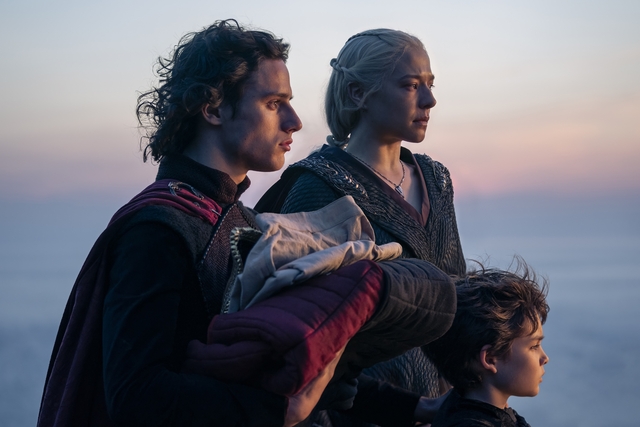
Harry Collett, Emma Darcy, Oscar Eskinazi, House of the Dragon@Courtesy of HBO
Q : How the relationship between Daemon and Rhaenyra has developed now that Viserys has died?
Emma D’Arcy: The fact that they can’t communicate proves an obstacle in the series. IIt’s the working of grief. I don’t know that either of them can find solace with each other, I don’t think that they can share that. I don’t feel that Daemon can share his experience of losing his brother. There’s a dislocation taking place.
Matt Smith: I agree. They can’t unburden themselves from this shadow. The way he died was so horrendous and they were right there next to him. There’s this elephant in the room constantly that they refer back to, that they weaponize against each other. It’s quite uncomfortable for both. I believe that there is a very deep sense of love between the two of them, which is challenged in many ways. It’s tested because he feels unaccepted by her, and reacts as Daemon does.
Q : What were the main challenges faced while filming this season?
Eve Best: It was sad that we weren’t all together so much as we had been in Season 1. That feeling of camaraderie in the face of awful shit that was going on. It was very nice to feel that we were all coming together. This season we were all separated, that was a big challenge for me.
Q : Was that the same for you, not getting to film as many scenes together?
Steve Toussaint: Yes, it was. With Corlys there are only two places where he is completely comfortable and himself. One is at sea and the other is alone with his wife. When he’s in the small council he has to put on a front and he feels he’s better than everybody there. But in those two situations, he’s completely honest. In Season 2, things that he has to confront his past, he has to deal with it. And they put this sacred relationship under strain for him. And I think for the first time he’s aware that he could lose this precious thing, his wife. It was an interesting journey.
Q : Daemon is such an incredibly complex character. Is there one particular aspect of his personality you love delving into?
Matt Smith: What do I quite like about Daemon? He flies by the beat of his own drum. His moral compass is his own, I admire that about him. I admire his conviction in his mistakes and his actions. For better or worse, he does them anyway, this he’s gonna roll. I like feeling that spirit of chaos and bravado, it’s like walking on a piece of glass. I like the tightrope that he’s defined for himself.
Q : Games of Thrones has a huge black fanbase. But in the original show, the black characters were more like black background dancers. IN House of the Dragon, you get to be royalty, you get to be in the thick of things. Why that is important?
Bethany Antonia: It was so important to me to be in a franchise of this scale because I didn’t get to see that when I was younger. When you’re that age, that’s when you start to develop what your dreams are going to be and what your aspirations are gonna be. And if you don’t see it, you can’t believe it. I wanted to be in something like this so that I could have somebody to dress up like. It’s one privilege that we just didn’t have. It’s a joy that you get to do when you go to these conventions. And so even if just for that, if one person gets to see it and go wow, that’s somebody who is like me, it was worth it.
Steve Toussaint: I second that. If you’re used to being represented, representation doesn’t mean as much because you’re used to it. When I was a kid there would be science fiction programs and there were very few, if any, people who looked like us. Me and my friends used to joke about it: “This is set in the future and we’re not there. What did they do to us?”
I can’t tell you the number of people who have contacted me – and not just people of color – through social media or letters and said how pleased they are to see this representation in this world. We are living in a world in which everybody is here. Everybody has a right to be represented: people of different races, genders, people of gender identity, and so forth. That is the world we should be striving for. There are voices out there that would argue against that. But for those of us who want to see that world, I think history is on our side.
If you like the article, share your thoughts below!
Check out more of Adriano’s articles.
Here’s the trailer of the series.

